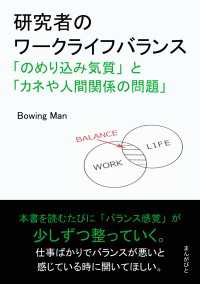- ホーム
- > 洋書
- > ドイツ書
- > Social Sciences, Jurisprudence & Economy
- > Education Science / Pedagogic
- > general surveys & lexicons
Full Description
This book has received the AESA (American Educational Studies Association) Critics Choice Award 2013.
Self-regulated learning (SRL) is defined as the strategic pursuit of academic goals that involves the control over thoughts, behaviors, and emotions. This notion is taken for granted as a form of empowerment and as a form of engagement that good teachers will foster. This book is about exploring different sides to this story. It first proposes a framework for critically examining dominant and taken-for-granted ideas in educational psychology, then applies that framework to the examination of SRL to show how it endorses middle-class conventions, aligns with neoliberal logic, and renders individuals subordinate to oppressive educational structures. The book is a critique that is not necessarily intended to lead to the rejection of SRL, but rather to invite teachers, researchers, and policymakers to reflect on the possible consequences and ethics of taking up the aim to institutionalize SRL.
Contents
Contents: Empowerment, Academic Success, and Critical Conversations - Critical Educational Psychology - Background on Self-Regulated Learning - A Consideration of Agency in Self-Regulated Learning - Efficiency, Productivity, and Adaptability:
Neoliberal Subjectivity - Social Class in Self-Regulated Learning - Adaptation, Prescription, and Dependency: Critical Pedagogical Reflections on the Ethics of Teaching Self-Regulated Learning.








